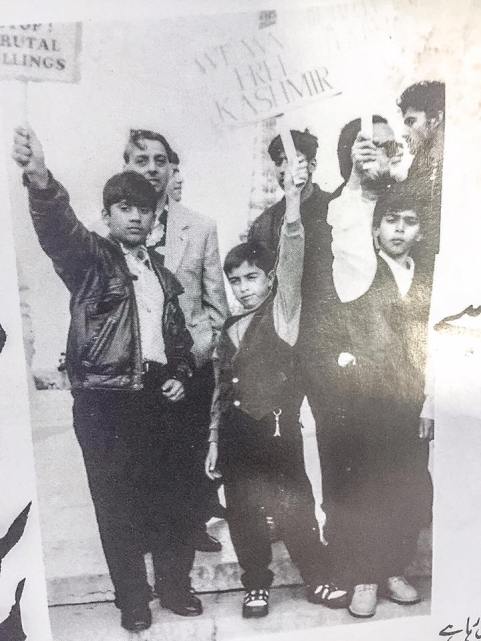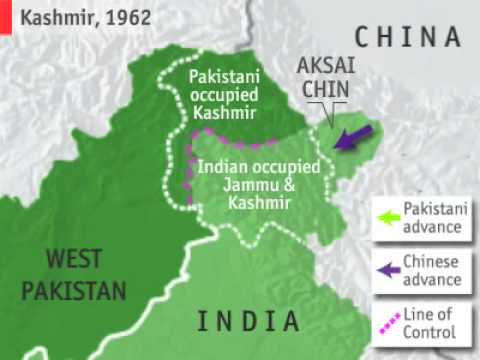Insight
” Jammu & Kashmir in the year 1947 was an independent country for all practical purposes. The Maharaja who ruled the State had signed agreements with both Pakistan and India to remain neutral and not be part of either country. India honoured that agreement but Pakistan did not.”
The newly independent was then invaded by the Pakistani army on 22nd October 1947 and the Maharaja Hari Singh, last ruling Maharaja of Kashmir, asked India to help, India agreed to help, under ‘specific conditions’.
This then gave way to the Instrument of Accession, a document acceding the state of Jammu and Kashmir to the dominion of India. The majority of the people of Jammu & Kashmir had protested against the accession, but the non-Kashmiri Dogra Maharaja signed the document and the fate of Kashmir. The Kashmiris were given the impression that once they had removed the Pakistani army and the hostilities had ceased, a referendum to confirm the accession would be held. This never happened.
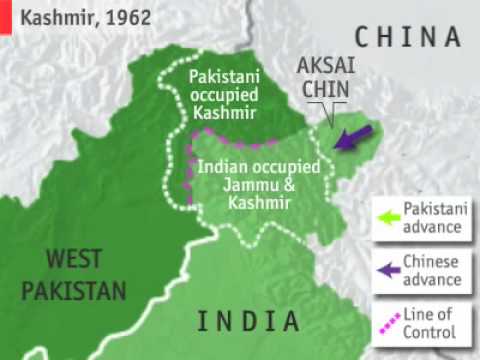
Bradford Literature Festival
Over the weekend I attended an event in Bradford called ‘The View from Kashmir’ as part of the Bradford Literature Festival, as an ethnic Kashmiri with roots in Srinagar, the issue of independence and self-determination of the Kashmiris is one I hold close to my heart, how could I not attend?
The discussion was led by a panel which consisted of Masood Khan, President of Azad Jammu Kashmir, Dibyesh Anand, Professor of International Relation, Sasha Bhat, a British Kashmiri activist and chaired by activist and author of Residue, Nitasha Kaul.
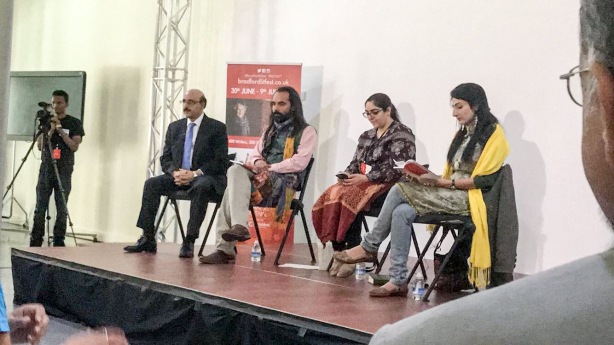
The conversation opened with Nitasha accurately describing the events that preceded and sealed the fate of Kashmir and asked the question; How is Administration different from Occupation? Dibyesh made a point of what he described as ‘problematic language’ used in the brochure for the event which stated part of Kashmir had gone to Pakistan, whilst the other part of Kashmir was disputed. He made a point which many Kashmiris on both sides of the border, more so the Indian side, wont shy away from, both India and Pakistan are indeed occupying Kashmir. The language of ownership was criticised by Nitasha as ‘two countries behaving like colonials’.
Sasha raised another point about language, how using words like ‘administered’ rather than ‘occupied’ is a great disservice to the Kashmiri people yet both India and Pakistan often refer to their parts of Kashmir as ‘administered’ and how social media is playing a major part in addressing and bringing the truth about Kashmir to the world. A state where there are curfews on the citizens leaving their homes and social media bans from time to time when there is an uprising, how can India claim it is a democracy?
See we are talking about one of the most militarised state in the world, where civilian death tolls have reached an alarming number surpassing that of any state in modern day India, whether we are referring to the murder of 55 Kashmiri civilians protesting in Sopore in 1993 or the mass rapes that have been carried out by the Indian Army, one of many incidents occurred in 1991 in the twin villages of Kunan and Poshpora in the Kupwara district of Kashmir where it is estimated over 100 women were gang raped by Indian soldiers posted in the region. The Investigation committee ruled the incident as a hoax and till date no one has been charged with the crimes.
Nitasha mentioned there are Kashmiris from the Valley, now in their 30s, who as children felt a great deal of anxiety when approached by soldiers in the region wondering if they have remembered to carry their identity card but the youths of today are not afraid and picking up stones and throwing them right at the occupying army. In Kashmir stone pelting is called ‘Kana Jung’ (Stone War) which youths see as their resistance to the occupation of their land.
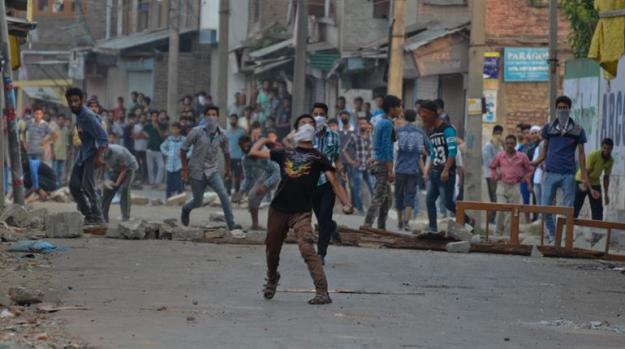
For me this was more than just about the governments of India and Pakistan but about the wider international community, the same community which is busy invading Middle Eastern countries to ‘liberate’ them of apparent dictatorship yet Kashmir remains an unsolved issue, an issue largely caused by the colonial British themselves.
President Masood Khan rejected the idea that Azad Kashmir is under Pakistani occupation and stated it was free, something a young man of Pahari descent from Azad Kashmir took offence to and referred to the numerous resources they felt were missing in villages in the Mirpur region in what Pakistan calls ‘Pakistani Administered Kashmir’. Another man also of the Pahari region of Azad Kashmir stated although their region provides a lot of electricity resources, they can be subjected to up to 12 hours of load-shedding (a common occurrence in Pakistan where people can go for hours without electricity to save energy).
Masood’s response was ‘insha’allah’ there will be less load-shedding in Azad Kashmir’, a response which was met with great amusement by those asking the questions. I did find it odd that such a strong statement had been made, but the President could not provide any solution or conversation other than ‘leave it to Gods will’.
The event heated up near the end, one man shouting, ‘our people are dying, they are suffering’ a Kashmiri man obviously worked up from the atrocities committed in Indian Occupied Kashmir, but like Nitasha replied, ‘if we cannot conduct a civil conversation in a room about such topics, then we can’t reach a solution’
I am a Kashmiri
I wholeheartedly agreed with her statement but equally felt the pain of the Kashmiri man, who may have been overcome by emotion and acted in such a manner because like myself, he may have yearned to have visited his Motherland, he may have struggled all his life with the conflict of identity like myself, born to a Pakistani national of ethnic Kashmiri descent, what is my identity?
Am I Kashmiri because that is my ethnicity? Or do I call myself Pakistani because my Father was born there even though he is ethnically a Kashmiri? Some of my friends joked ‘You’re Indian then’ a comment which used to cut like a knife, to label me with the same identity my people were resisting against!
The same weekend I also spoke with a man named Shashi Tharoor, a member of Parliament of Lok Sabha in India. He was discussing his book ‘Inglorious Empires’, an interesting piece of writing about India’s ex colonial masters. A question about his stance on the Kashmir issue was asked and Shashi stated he did not see Kashmir as occupied and further rejected the notion of Kashmiri self -determination as they were never, he claimed, an independent nation. I reminded Shashi his statement was incorrect as the people of Princely State of Jammu and Kashmir chose independence from India and the newly formed Pakistan in 1947. He claimed Kashmir was not really a truly independent nation and was more concerned about clearing Kashmir of its terrorists, I asked who are the terrorists in Kashmir? ‘The men with the guns’ he replied, I wondered, did he mean the militant separatists or the nearly 500,000 soldiers deployed in the Jammu and Kashmir, especially in the Kashmir Valley enclave?
Many Indians claim Kashmir is an integral part of India, is it just the land India feels a connection with or the people too? The roars from the other side ‘Kashmir banega Pakistan (Kashmir will become part of Pakistan)’ are no better, don’t these people hear our cries for Independence?
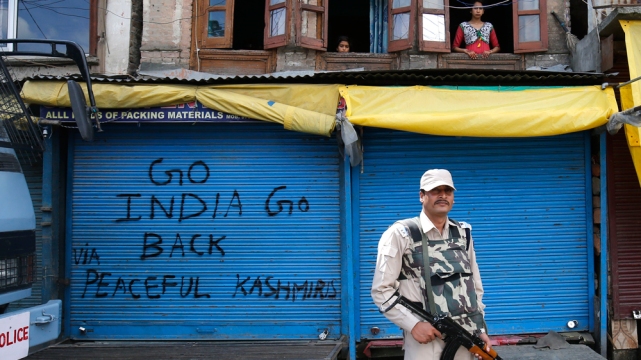
Why are angry mobs of youths in Kashmir dispersed by means of rubber pellet bullets yet in other cities in India they only use water to break up mobs? Most importantly which state in India has even as half as much military presence as Kashmir?
Dibyesh has made a point of how many secular Hindus in India as well as religious Hindus agreed on the Kashmir issue, in that they do not believe in the right of self-determination of Kashmiris. Yet there are also those who are afraid of being outcast as anti-nationalists like activist Arundathi Roy, an advocate for the independence of Kashmir who was even charged with sedition when she stated, ‘Kashmir has never been an integral part of India, it is a historical fact, even the Indian government has accepted this’. The charges were thrown out.
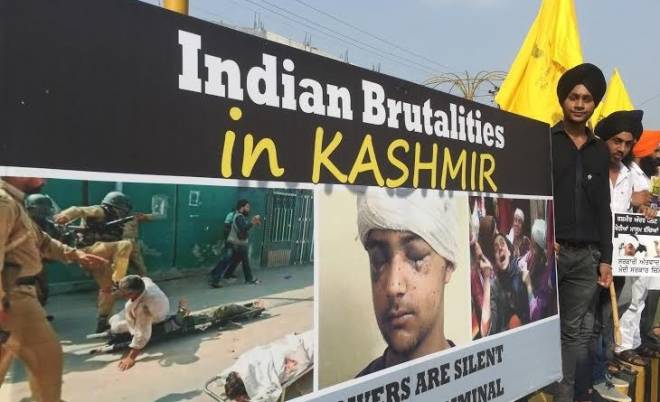
The events really made me think about my own involvement in the Kashmiri freedom movement, am I doing enough as a Kashmiri? Yes, we talk about the International community but that is also whom we are a part of. It is obvious that most of the people who really care about the status of Kashmir are fellow Kashmiris, non-Kashmiris have often made it clear they are impartial, it is up to us to keep raising awareness, to keep questioning so called leaders who choose to turn a blind to the atrocities.
Self-determination is a RIGHT and it is our right as Kashmiris. I had not always understood the importance in my Dad taking me along to ‘Free Kashmir’ rallies as a kid, with banners and slogans parked outside the Indian embassies in England as well as Paris.
